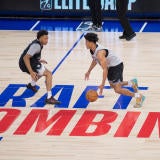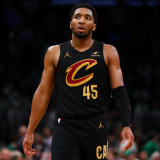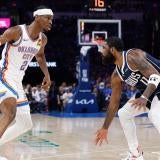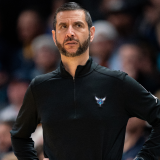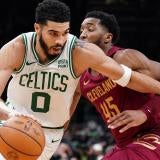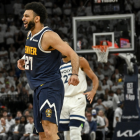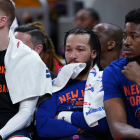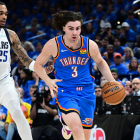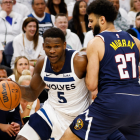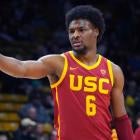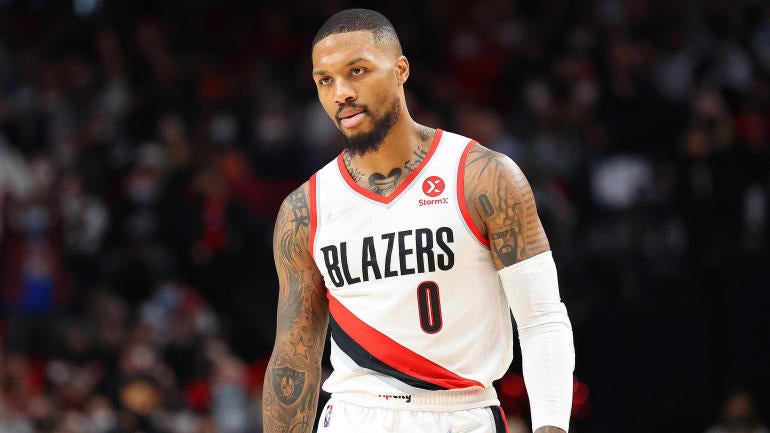
Terry Stotts is gone. Neil Olshey is gone. The question, for the Portland Trail Blazers, is: Who's next?
After nine years of relative stability, the Blazers are at -- or at least approaching -- a crossroads. This season they're 11-15, and they've lost seven of their last eight games, all but one by double digits. New head coach Chauncey Billups has them trapping ball-handlers, giving up a zillion corner 3s and yielding 112.5 points per 100 possessions, the third-worst mark in the NBA. Damian Lillard shot poorly at the beginning of the season, is now out with an abdominal injury and reportedly wants to sign an extension next summer. Olshey's successor might prefer to trade him.

CBS Sports HQ Newsletter
Your Ultimate Guide to Every Day in Sports
We bring sports news that matters to your inbox, to help you stay informed and get a winning edge.
Thanks for signing up!
Keep an eye on your inbox.
Sorry!
There was an error processing your subscription.
"There's a lot of shit going on," CJ McCollum told The Athletic's Jason Quick on Monday.
A day later, the Blazers announced that the injury McCollum had sustained in the fourth quarter of their 145-117 loss to the Celtics on Saturday, which they had initially called a rib contusion, had been diagnosed as a collapsed lung.
CBS Sports' James Herbert and Sam Quinn are here to sort through all the bad news and try to make sense of Portland's murky future:
James Herbert: So, a couple of things:
Lillard's camp wanted the Blazers to trade McCollum and four first-round picks for Ben Simmons, per Wojnarowski. They discussed a Simmons-for-McCollum swap that would've sent one first-rounder and either Nassir Little or Anfernee Simons to the 76ers, but Philly wanted multiple picks and multiple swaps, per The Athletic.
In July, Lillard will be eligible to sign a two-year, $107 million extension that would keep him under contract until the summer of 2027. Lillard will turn 37 in the summer of 2027.
It makes sense that Lillard would want to play with Simmons, an all-world defender who is awesome in transition, puts pressure on the rim and addresses all of Portland's most persistent problems. But should interim general manager Joe Cronin pay the sort of price that would satisfy the Sixers? Is he even empowered to make such a move?
And what about the extension? Given that the Miami Heat have committed to paying Jimmy Butler upwards of $50 million in his age-36 season, is this simply the cost of doing business with a superstar in his early 30s? Are the Blazers better off tearing it all down? It feels like everything -- from trading Lillard to trading just about everybody except Lillard -- is on the table, and the biggest variable is how badly ownership wants its franchise player to end his career where he started it.
Sam Quinn: I think we can boil Portland's predicament down to one fatal flaw: a lack of self-awareness. The Blazers spent the past half-decade acting like a contender when there was never any evidence to suggest that they were one. They've made it out of the first round twice since LaMarcus Aldridge left. Their 2016 triumph over the Clippers was largely the result of injuries, their 2019 trip to the conference finals a consequence of a seeding quirk that forced the Warriors and Rockets into a second-round deathmatch. This was apparent to everyone except the Blazers, who, seemingly ignorant of the context generating their success, refused to break up the core, the coaching staff or the front office that benefitted from it.
There's an easy parallel here between Portland and the Toronto Raptors, who for years benefited from playing in a conference short on legitimate contenders but never suffered such delusions of grandeur. They eventually graduated out of the junior contender consolation bracket and became full-fledged champions when they had the guts to take the Kawhi Leonard risk that Portland never would have considered. The Blazers never felt the need to take a swing like that because, in their minds, they already had a core good enough to contend. They just needed to support it with the right role players. Shockingly, the upgrade from Al-Farouq Aminu to Kent Bazemore wasn't as impactful as trading for Kawhi.
Extending Lillard and trading for Simmons feels too little, too late, a pair of moves that simultaneously changes the course the Blazers have charted for several years and sends them further down the road to nowhere. Is there much evidence to suggest they're one Ben Simmons away from a championship? Can any one player fix the NBA's worst defense? Can a Portland team with a suddenly mortal-looking version of Lillard handle the spacing issues that come with a Simmons-Jusuf Nurkic pairing? Is ownership really going to pay to keep Robert Covington and Simons on top of all of their other commitments? There might be a contender to be chiseled out of a Simmons-Lillard partnership, but it would take a lot of time and moves that Portland might not have the flexibility to make if 76ers czar Daryl Morey extorts them for four first-round picks on top of McCollum.
Most objective viewers would agree: Simmons makes the Blazers better. He almost certainly doesn't make them champions. The Blazers, however, have never been able to view themselves objectively. A new GM might change that. Woj's reporting suggests that most of the candidates to replace Olshey are more interested in a rebuild than a Lillard extension. Given Portland's history, my inclination is not to believe that until I see it. So let's take a step back from the hypotheticals for a moment and consider the position that is open right now. Is Portland a desirable job? Are they going to be able to attract the right GM? Do you have a certain type of candidate in mind?
Herbert: There are only 30 of these jobs, and teams that are set up perfectly aren't usually looking for someone new. That said, the possibility of Jody Allen selling the team hangs over everything, as does a potential Lillard extension. If a candidate is dead set on going a certain direction, then the job is only as desirable as ownership's willingness to go that way.
On the Toronto parallel: Masai Ujiri's front office took the exact same type of criticism you're sending Portland's way before an almost unimaginable confluence of circumstances made that Kawhi trade possible. It's not as if the Raptors didn't try to acquire a superstar before that, and it's not as if the Blazers prefer signing role players to All-Stars. What franchise-changing trade were they supposed to make?
If you don't like the Simmons plan because you don't think it immediately turns them into champions, then I'm guessing you're not heartbroken that Olshey reportedly turned down a Jrue Holiday deal that would have sent McCollum and three first-rounders to the New Orleans Pelicans in the 2020 offseason. That's the kind of move that would have made them much more balanced, but it would have essentially guaranteed a hefty extension for Holiday -- it took four years and upwards of $135 million to keep him in Milwaukee -- and limited their flexibility to improve around the edges.
I don't think that was an easy decision last November, and the same goes for Simmons now. It helps that he's 25 years old -- six years younger than Lillard, five years younger than McCollum -- and under contract until 2025. But while I would personally love to see Lillard and Simmons play together, I can understand why Portland would be reluctant to give up a boatload of picks and swaps and McCollum to make it happen.
Zooming out, am I correct to assume that you think the Blazers should absolutely move Lillard and start over? Lillard's camp wants the team to trade some veterans and build a different type of team around him (on the enormous extension, of course), according to Woj, and I'm not sure that's the wrong idea. How much better would they be if they had some size on the wing? Don't you think there might be trades out there involving McCollum, Covington, Nurkic, Norman Powell or Larry Nance Jr. that would make their pieces fit better defensively?
To be clear, I am not suggesting that Portland should just perpetually cycle through role players; I am suggesting that the core can be improved. You're right that Simmons wouldn't fix everything, but I'd argue that the poor defensive fit and the bleak vibe around Portland at the moment is obscuring the talent on the roster.

Quinn: Could the Blazers not have snuck in on Leonard? McCollum and DeMar DeRozan were roughly analogous at the time. They had three first-round picks in the summer Paul George was traded. Surely they could have topped Philadelphia's offer of Covington and Dario Saric for Butler when Butler's value had cratered, right? There were opportunities out there. Holiday would have been somewhat less enticing considering the picks attached, but perhaps there would have been room for negotiation. Three first-round picks is overkill. Two protected ones? Now we're onto something, especially since, extension or not, such a deal wouldn't have locked them into anything. If it hadn't worked, they could have still pivoted into a rebuild. Holiday isn't available today, but if he were, he'd fetch an enormous price. A Lillard extension offers no such flexibility. Nobody's taking on $55 million for his age-36 season even after a cap spike.
You could even argue McCollum's contract carries negative value. He's due $35 million in his age-32 season and he's never made an All-Star team. He holds specific value to Philadelphia because of its unorthodox roster, but let's say Morey doesn't budge on Simmons. Who is the other team desperate to land McCollum? The Lakers would have loved him pre-Russell Westbrook, but that ship has sadly sailed. The Blazers might be able to get positive value for McCollum, but there's no non-Simmons trade out there that's netting them equivalent talent. Any team trading for McCollum right now is giving up multiple dimes for a dollar. That's really where Portland stands with all of its veterans. They traded for Covington and Nance at the peak of their value. Neither is getting the Blazers much more than they gave up, if that. Teams rarely pay for centers, so a Nurkic haul is out. If Powell could have returned any more than Gary Trent Jr., Toronto would have taken it a year ago. These are useful players. They are not players that are going to land transformative returns. What would a transformative return even look like? These are all essential pieces. They'd be filling one hole by creating another.
So yes, I think Portland should tear it down and start over. Frankly, I think they should've done so a year ago. Just ask Oklahoma City how much more you can get when you deal your stars from a position of strength. There's still hope when you can't, though. Look at Houston, who let the James Harden situation fester into the 2020-21 season and still managed to swing a deal that sets a replicable blueprint for Portland. Yes, they landed a mountain of future picks that look more valuable by the day, but they also quietly set themselves up for the tank that got them Jalen Green.
It's not a coincidence that we're having this conversation on the same day reports indicated that the Pacers plan to pivot into a rebuild. The 2023 NBA Draft is one of the strongest in recent memory. Victor Wembanyama is generational. Scoot Henderson would be a No. 1 overall pick in a normal class and Emoni Bates was once considered the next Kevin Durant. A lot of teams are going to want to be bad next season. Portland can get a head start on doing so by trading Lillard here and now.
There are no guarantees in the draft, but, to take this back to my original point: The Blazers might have had a chance at Leonard, George or Butler if they'd been willing to take the plunge. They didn't, and how'd that work out for them? They might have a chance at the next generation's equivalents now. If Lillard couldn't reward their patience in his 20s, is he all that likely to do so in his 30s? And are we sure that he even wants to? Loyalty is Lillard's brand, but if he wanted to escape Portland while preserving the appearance of loyalty, wouldn't demanding an extension they aren't comfortable giving him be a nice place to start?
Herbert: (Before I respond to your general point, an aside on McCollum: I sure hope this collapsed lung turns out to be less scary and serious than it sounds. Also, I'm definitely higher on him than you are, but I'm not sure I agree about him holding specific value to the Sixers, given how well Tyrese Maxey and Seth Curry have played this season.)
OK. Wow. Are you saying Lillard secretly wants out and is trying to turn the team into the bad guy? Don't be surprised if he tweets about you.
Anyway, I'm glad you brought up timing because I think that's where we diverge on this. The Blazers don't have to make any franchise-altering decisions today. There is somewhat of an opportunity cost to waiting, sure, but the 2023 draft isn't relevant yet and, with both Lillard and McCollum sidelined for now, I'm not particularly worried about them winning too many games to get a good 2022 pick. Beyond that, is the possibility of Lillard retiring a Blazer worth something to you? Are you completely convinced that this situation is hopeless?
You might turn out to be right that Portland can't get a difference-maker for any combination of McCollum, Covington, Nurkic, Powell and Nance. That doesn't mean that it must pivot immediately. The Blazers might as well keep their options open in between now and July, the earliest that Lillard can sign his extension. If there's no meaningful move to be made before the trade deadline, maybe an unexpected opportunity pops up on draft night. We don't even know who will be running the team at that point.
If you think that the person running the team will eventually conclude that trading Lillard for an enormous haul of young players and draft picks -- and going into full tank mode -- is the best way forward, fine. It is also reasonable, however, for Portland to first exhaust every opportunity to build a contender around the homegrown superstar who has repeatedly said he wants to win there.
Before Lillard hit his legendary series-winner over Chandler Parsons in 2014, it had been 14 years since the Blazers had made it out of the first round. Their 2019 trip to the conference finals may have been brief, but it was also their first since 2000. It is true that some teams have waited too long to rebuild, but there's a good reason not to trade a player of Lillard's caliber until he asks out: Once you do, there's no telling when you'll get another one.
Quinn: I'd agree with you if we were talking about LeBron James or Giannis Antetokounmpo, but we aren't. Here's some food for thought: Twenty-five of the 30 NBA teams have had an All-NBA player in the past five seasons, and 12 of them have had a player on the All-NBA First Team. If you're worried that this hasn't translated to some degree of league-wide parity, 13 teams have made the conference finals over the past five seasons. There are certain players that are so transcendent that you should never, EVER trade them. There's no return you could realistically get that would ever generate more championship equity over the long haul than such players create even in a single season. I don't know where exactly that line is, but I'm inclined to believe that Lillard falls on the wrong side of it. Even if they can't produce a Lillard-caliber player in the near term, the odds suggest that they should at least expect to find a reasonable facsimile.
The Blazers don't necessarily need to act right this second, but don't forget that Lillard is 31, dealing with injuries and in the middle of one of his worst seasons as a professional. I'd imagine there are still suitors willing to pay sticker price, but that might change if this sustains for 60 more games. Would waiting until the summer kill them? Probably not. I don't envision a scenario short of catastrophic injury that would diminish Lillard's trade value too much, and, given the low-cap space environment we're entering this summer, teams interested in Covington or Nurkic will probably have to work with the Blazers on a sign-and-trade. Waiting on a new GM wouldn't be the end of the world, but I'd be opportunistic above all else. If somebody makes the right offer for anyone, even Lillard, there's too much risk to hesitate. Simmons is proof enough of how much trade value a player can lose in a short period of time. Lillard comes with plenty of risk factors that he didn't.
Herbert: From the 10th game of this season onward, Lillard's efficiency was in line with his career numbers, even though he was dealing with abdominal pain and had a couple of rough nights directly before this stretch of missed games. I'm not particularly worried about his two weeks of bad shooting following a shortened, injury-plagued offseason.
I can't say I agree about the ease of finding a "reasonable facsimile" of Lillard, either, but we do have some common ground: Yes, the Blazers should be opportunistic. That might mean sacrificing picks in win-now moves, like the ones that brought Covington and Nance to Portland. That might mean selling off veterans, soft-tanking the rest of the season and reshaping the roster around Lillard in a few months. That might even mean trading Lillard. As uncertain as things are right now, though, I'm pleased that, one way or another, more changes are coming.
In 274 minutes over 17 games this season, though, the Lillard-McCollum-Powell-Covington-Nurkic lineup (famously dominant last season!) barely has a positive point differential, thanks to an absolutely abysmal defense. This should be clarifying, not in the sense that Portland has to blow everything up, but that, if it doesn't, then it needs to put strong, smart and switchable defenders around Lillard -- especially if Billups is all-in on aggressive pick-and-roll defense.
Some trade thoughts: Hypothetically, could the Blazers win a Myles Turner bidding war? Do they see Kristaps Porzingis as a good fit with Lillard? Are they interested in nabbing Eric Gordon (and/or Daniel Theis, Danuel House) from the Rockets, Kenrich Williams from the Thunder or Thaddeus Young from the Spurs? Maybe the Grizzlies will be open to moving Kyle Anderson before he hits free agency. Maybe the Pelicans will shop Josh Hart as soon as they're allowed to trade him (Jan. 15). Maybe the Nets will decide they can't afford to wait for Nicolas Claxton to develop.
It's unclear whether or not Portland will be able to pull off the kind of moves that changed everything for the Hawks, Suns and Bulls in recent seasons. It appears, though, that Lillard will at least give the next front office a chance to try. If the Blazers lacked self-awareness under Olshey, it is because they overestimated the roster's defensive capabilities. No matter how this GM search goes, it's safe to say nobody thinks the status quo is good enough anymore.








